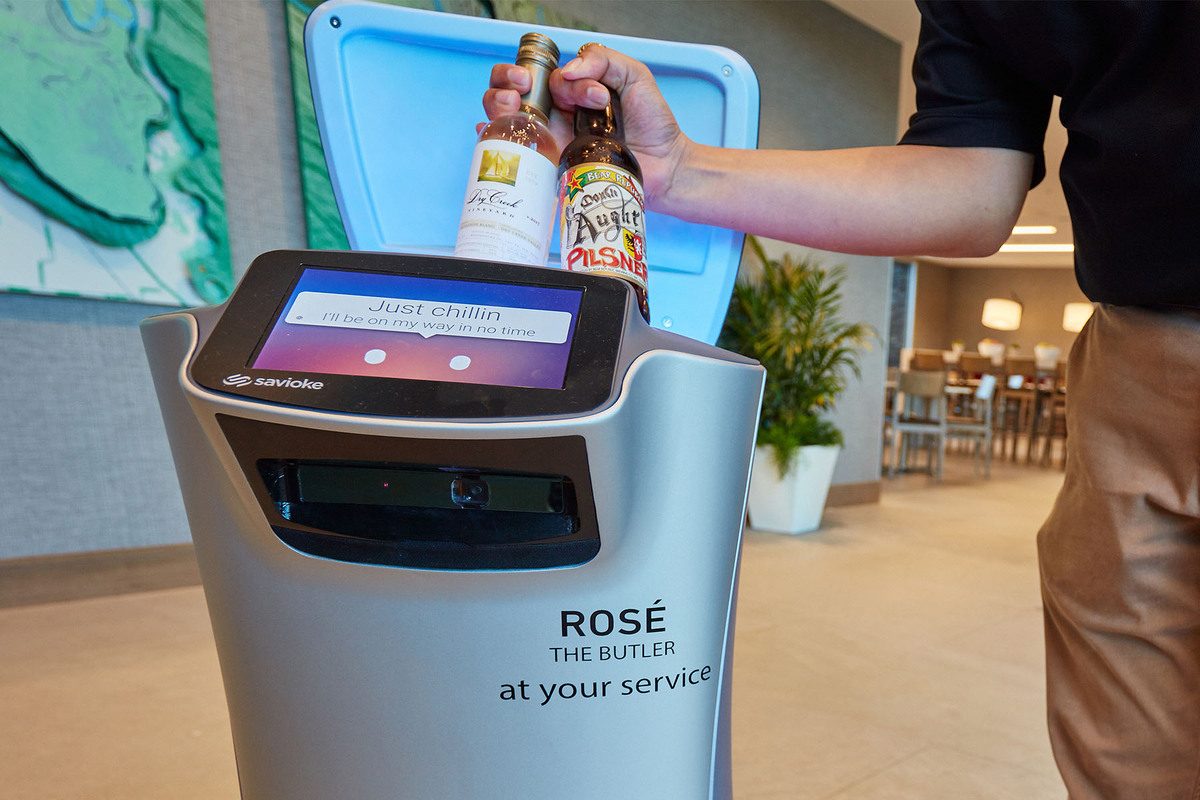Skift Take
Given the constraints of today’s labor market — and the speed to onboard new hospitality talent — it’s time to push the envelope when it comes to artificial intelligence, robotics, and automation.
No frequent traveler has escaped the toothpaste walk of shame — the stroll to the front desk to grab a forgotten toiletry, during which that guest prays no one wants face time.
But that’s been eliminated at the eight California hotels owned by Seaview Investors, thanks to robot ambassadors that deliver hotels, sundries and dental necessities in five minutes or less.
“The goal isn’t to replace anybody, (but) just make the jobs better for those who work here,” said Tiffany Jassel Bevins, Seaview’s director of asset management.
“It allows staff to deliver more personalized service to guests in front of them. And we have so much positive feedback on TripAdvisor (surrounding the robots).”
The technology from Silicon Valley-based Relay Robotics is programmed to mingle and tell jokes, said Steve Cousins, the company’s chief technical officer. But while offering something a bit different from other hotels attracts guests, it can also expand the boundaries of what technology can accomplish.
Just ask Klaas van Lookeren Campagne. The CitizenM CEO says a digital-first strategy has led to the brand being the most profitable per square foot among its competitors. “We are living now after the pandemic in the fight for resources. I think everybody is struggling for good employees,” he said. “Guess what, if you have the highest guest satisfaction and these cool tools, of course they like to work for you.”
Innovations like one app for guests and another for employees mean CitizenM “ambassadors” — or employees — can relay details about neighborhood attractions directly to a customer’s device. Ambassadors can also make a room key at the bar, for instance, while having a chat and a cocktail, eliminating the wait at a traditional front desk.
That experience has made retaining staff easier. “If you look at our website there’s hardly any (open jobs for) hoteliers, we are only looking for data engineers — I think that’s the direction (you’re moving toward),” van Lookeren Campagne said.
Other companies have been driven by necessity to make dramatic shits in their operations. Accor launched a pilot at ibis Styles London Gloucester Road, the brand’s first fully digital hotel in Northern Europe. It’s the first step in a roll-out plan that will impact at least 50 percent of its hotels in Europe over the next few years.
“This is not about robots or faceless technology. This is about the smart integration of innovative, customer-facing technology at pace and at scale. Technology is part of our daily lives and is now fully part of our hotel experience,” said Carla Milovanov, Accor’s senior vice president for customer technology services. “With this important step, we give our guests the opportunity to adapt their hotel stay according to their preferences.”
Accor’s technology already automates some hotel distribution activities, and allows staff to spend more time with guests rather than on administrative or manual tasks. Click Pay Collect enables ordering from a hotel’s digital menu from just a phone, eliminating calls to a restaurant or placing paper on a doorknob. Since the ordering is fully integrated within the hotel’s ecosystem, expenses can be charged to the room and paid on check-out.
Other features in the cloud are set to transform the physical check-in and check-out experience, too. Accor’s Gloucester Road property premiered the Accor Key, a smartphone-enabled code that allows guests to access elevators and enter their rooms, eliminating the need for check-in desks altogether.
Meanwhile, hotels like The Cosmopolitan of Las Vegas have taken to streamlining guest communication a step further with use of artificial intelligence. The sassy Rose chatbot originally launched customer service — like restaurant recommendations, requests for extra pillows, and guided tours of the property — via text message. Director of Digital Marketing Lindsey Riggs said guest engagement is so high that the hotel created a Digital Guest Services Team, which monitors conversations throughout the day and helps Cosmopolitan respond to inquiries within 60 seconds.
“Thanks to (artificial intelligence), Rose has the ability to use conversational data to learn from guest interaction with her over time, which helps us better understand what our guests want and need,” Riggs said.
Data show that guests who interact with Rose are on average 30 percent more satisfied with their stay as compared to those who do not, said Riggs. “Highly engaged” guests — those who send Rose five or more texts during their stay — record a 28 percent higher dollar spend than those who don’t interact with her.
“This tells us Rose’s unique and playful personality not only strengthens relationships and overall guest satisfaction, but her undeniably unique tone of voice is what helps her standout from others in the hospitality industry,” Riggs said.
And while human staff can often wilt in the wee hours in a city filled with late-night high-rollers, “automation allows The Cosmopolitan of Las Vegas to have an always-on brand ambassador,” Riggs said.
[CORRECTION: The article has been updated to mention that “highly engaged” guests record a 28 percent higher dollar spend with Rose, not a 28 percent longer stay.]
Skift AI Travel Newsletter
AI coverage across travel sectors that’s focused on separating trendy moves from good ideas – in your inbox every Friday.
Have a confidential tip for Skift? Get in touch
Tags: accor, artificial intelligence, business travel, citizenm, coronavirus recovery, future of lodging, hotel technology, hotels, technology
Photo credit: An automated delivery at a hotel Seaview Investors
